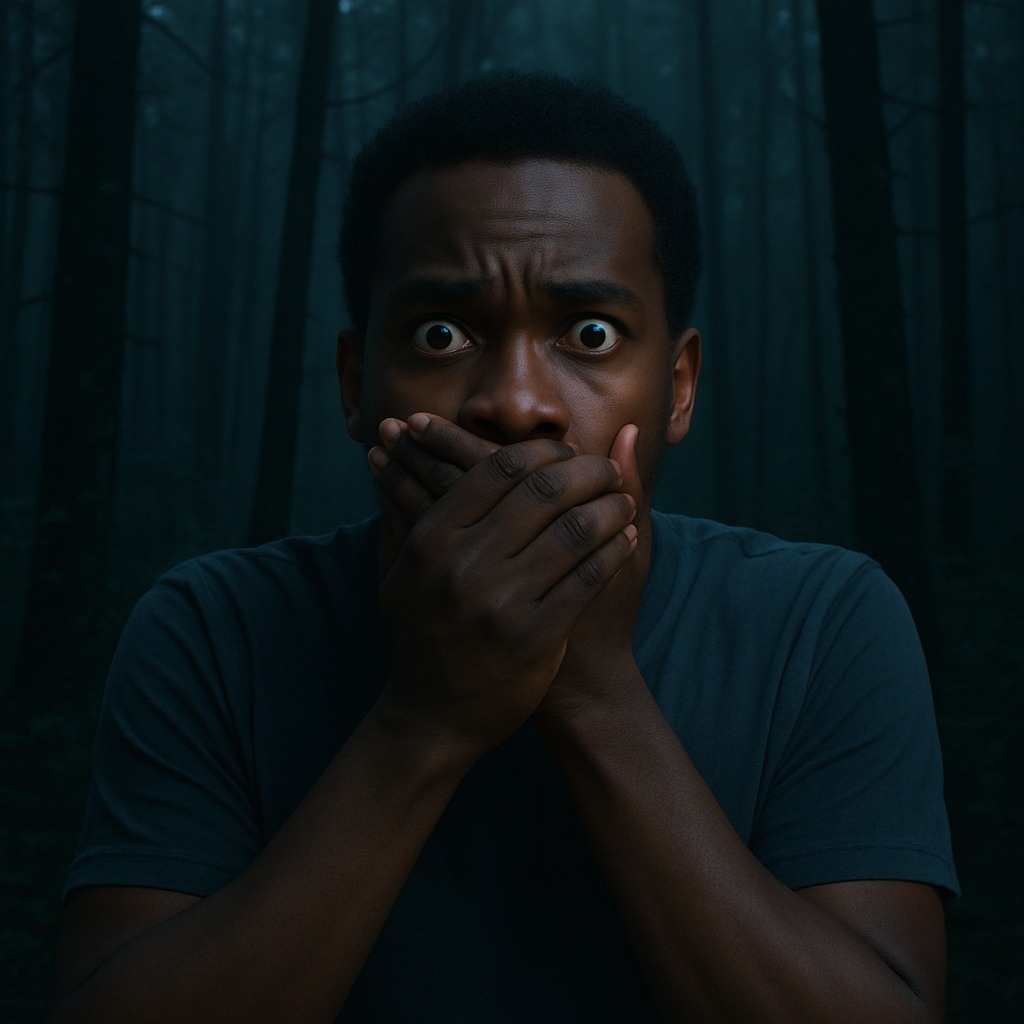
WHISPERS OF THE BUSHBABY
There’s something about the silence of a forest at night. Not the ordinary hush of dusk or the steady quietude of sleep. No. This one breathes, it watches, it waits, and sometimes, if you’re not careful, it reaches for you.
Breathless, I stumbled forward, my worn brown leather sandal cracking against something hard. I froze. The sound was crisp, almost deliberate. My first thought: an unfortunate snail crushed beneath my heel. What else could it be in a forest like this? But I had neither the time nor the clarity of mind to dwell on broken shells. The forest stretched endlessly around me, thick with shadow and mystery, and my only concern was finding Agbabiaka. Without him, I was hopelessly lost.
The torchlight in my hand, a small solar-powered thing with a flickering beam, offered little comfort. Its light danced weakly on the forest floor, illuminating tangled roots and the occasional fluttering insect. My phone was useless; no signal, no Google Maps, just a black screen reminding me how far I was from the world I understood.
I had come from my university in Mauritius to document the legendary Idanre Hills in Ondo State, Nigeria. It was meant to be a homecoming of sorts. Born and bred in Nigeria, I’d long heard tales of this ancient land, stories straddling the line between history and myth. The most compelling for me was that of Agboogun, the mystical hunter whose hieroglyphic-like inscriptions still marked the rocks of Idanre. Egypt had hieroglyphics. Nigeria had Agboogun. And I was here to tell that story.
“Didn’t Agba say where he was going before he vanished?” Sharon’s voice broke the silence. Her Queen’s English clipped through the air, delicate but edged with panic. She was our cinematographer, blonde and pale, with a pointed nose and lips that were too pink to look real. She called Agbabiaka “Agba” because his name was, in her words, “a tongue twister.”
I shook my head. “He just said he’d keep watch through the night. That we should rest easy.”
Sharon had gone mute ever since we realised we were lost. She walked beside me like a shadow, silent, stiff, until now. Her voice carried a blend of accusation and despair.
“We shouldn’t have taken the shortcut. I said it, didn’t I?”
“You did,” I admitted. “But no one could have predicted the car would break down. With night falling fast, what choice did we have?”
She didn’t reply. She only shook her head, lips pressed thin.
We were supposed to be three: me, Sharon, and Marley, our Jamaican lighting technician, whose snoring could put thunder to shame. Marley was a deep sleeper. The kind who could sleep through an earthquake and wake only to ask if breakfast was ready. So, when we found Agbabiaka missing, we left him behind, thinking it would be a brief search.
But it wasn’t. We wandered deeper and deeper, the forest swallowing us whole.
“Wait,” Sharon whispered suddenly. “Did you hear that?”
“What?”
“Listen.”
I paused. The forest was alive with the sounds of crickets, rustling leaves, and distant hoots. But there, beneath it all, was something else. Faint, then louder. The cry of a baby.
I felt sweat break across my forehead. The night was cold; the sweat wasn’t from heat.
“A baby?” Sharon asked, almost to herself.
As a boy in the Nigerian countryside, I’d been fed on tales, stories passed down by candlelight, voices hushed, eyes wide. The bushbaby was one such tale. In Yoruba, they called it Egbere: a creature that cried like an infant, roamed the forest at night, and carried a mystical mat. Steal the mat, and you’d become instantly rich. Fail, and you’d be devoured.
Science told me it was just a Galago, a shy primate with large eyes and nocturnal habits. But science wasn’t here now, the stories were.
“We need to help the baby,” Sharon said.
“There’s no baby,” I said flatly.
“What do you mean?”
I grabbed her hand. “We need to go.”
She resisted, confused. “But…”
“No time to explain.”
We ran. Or rather, I ran, dragging her behind. The cries grew louder, surrounding us. Then Sharon tripped, crashing to the ground with a yell of pain.
“Can you get up?” I asked, turning the torch to her.
“My ankle… I think it’s sprained.”
“Are you serious?”
“Why would I joke about this?” she snapped.
I helped her up, slinging her arm around my shoulder. Her steps were limp, but we had to keep moving. The cries were now everywhere, echoing through the trees.
Then we saw it.
Sharon screamed. I froze.
In the beam of my torchlight stood a creature, if one could call it that, beside the thick trunk of a towering Iroko tree. It was feeding…on a human leg. Blood pooled beneath it. The body was unmistakable.
Agbabiaka!
The thing looked up. Bulging, pupil-less eyes. Fangs glinting with fresh blood. Clawed fingers like hooked machetes. Its skin was the colour of sunburnt earth, stretched tightly over a distended belly. It hunched, like the weight of its evil had bent its spine, and it cried, not like a monster, but like a baby.
Sharon screamed again. The creature turned.
Time stopped.
Then…
A sharp kick jolted me.
I blinked. Agbabiaka stood before me, smiling, dressed in a bright adire fabric. “Akanni, everyone’s ready. I’ve checked the oil and water. The car’s good to go.”
I looked around. No forest. No monster. Just daylight and the smell of fried plantain drifting from a roadside stall.
“We’ll take some shortcuts,” Agbabiaka added, “get to Idanre Hills before noon.”
I stared at him, the pieces falling back into place, the dream, the shortcut, the bushbaby.
“Oh no,” I whispered.
